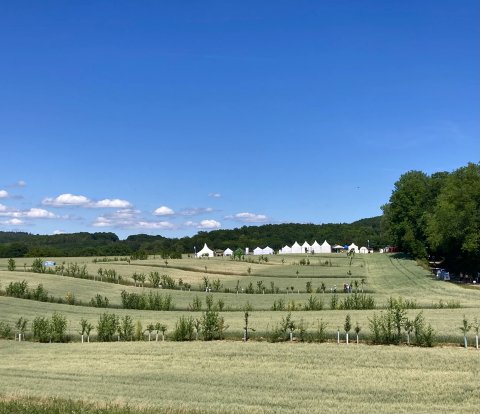The Organic Field Days 2022 in Germany, a meeting point for organic agriculture, took place this year from June 28 to 30 at the Gladbacherhof in Hessen, where the University of Gießen operates its institute for research and experiments in organic agriculture. The event, which hosted around 11.500 visitors, offered an extensive program on different topics relating to organic agriculture. And one of the highlights was agroforestry. The German Association for Agroforestry (DeFAF) was represented with an interactive information booth. These days were not only a complete success for the association – agroforestry also received a lot of positive feedback.

The information booth was located with those of many other well-known agroforestry actors directly above the arable agroforestry system that was established by the University of Giessen in 2020 and is very nice to look at. On the first event day agroforestry was a thematic focus and, in addition to several guided tours to the agroforestry systems, exciting presentations attracted many visitors to take part in the forum organised by Triebwerk, a young agroforestry advisor’s business. Part of this forum was a panel discussion with Janos Wack from Triebwerk, the farmer Felix Riecken from Rieckens Landmilch, Ophelia Nick, the parliamentary state secretary of the Federal Ministry of Food and Agriculture (BMEL), as well as Hubert Heigl, board member of the Federation of the Organic Food Industry (BÖLW). Current conflicts and hurdles to the implementation of agroforestry were hotly discussed. Remarkable was the enthusiasm and hope of all parties that agroforestry will soon become an important element of the agricultural policy framework in Germany, even if the regulations are not as good as they could be in order to promote agroforestry effectively.

The information booth of DeFAF was frequented by a large number of participants looking for information about agroforestry. The diverse information materials were very well received, as was also a very special activity: Visitors got the chance to plant their own small agroforestry system in in egg cartons and coconut substrate. They could choose from various seeds: in addition to green manure, teff and mustard seeds a range of different tree seeds were offered. Many visitors were very excited to have something to touch and try out for themselves besides all the posters and scientific information at the event.
The DeFAF was also able to increase its membership during the Organic Field Days - the joy was great when the 300-member mark was exceeded. Thus, the Eco-Field Days were a great opportunity for exciting discussions, new impulses and a visibly growing agroforestry network in Germany.
Julia Günzel












